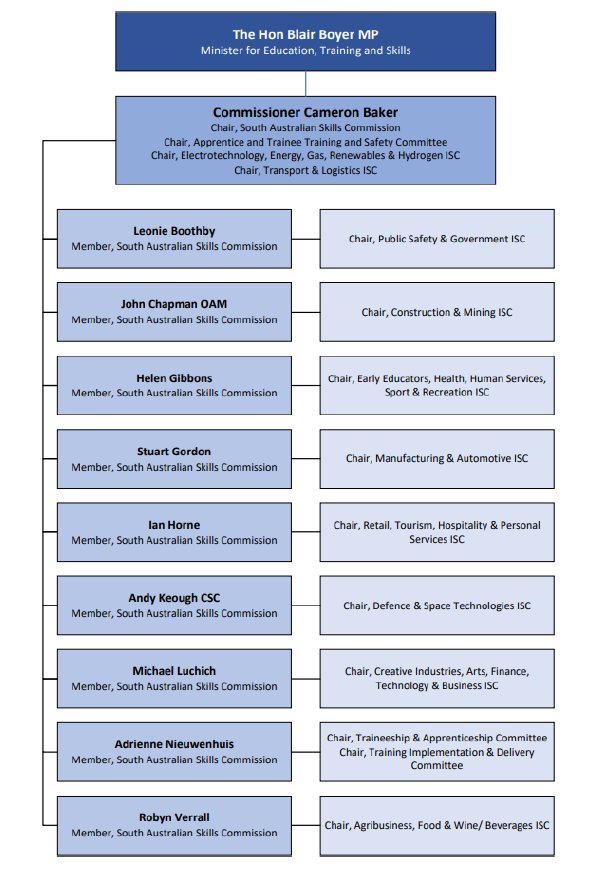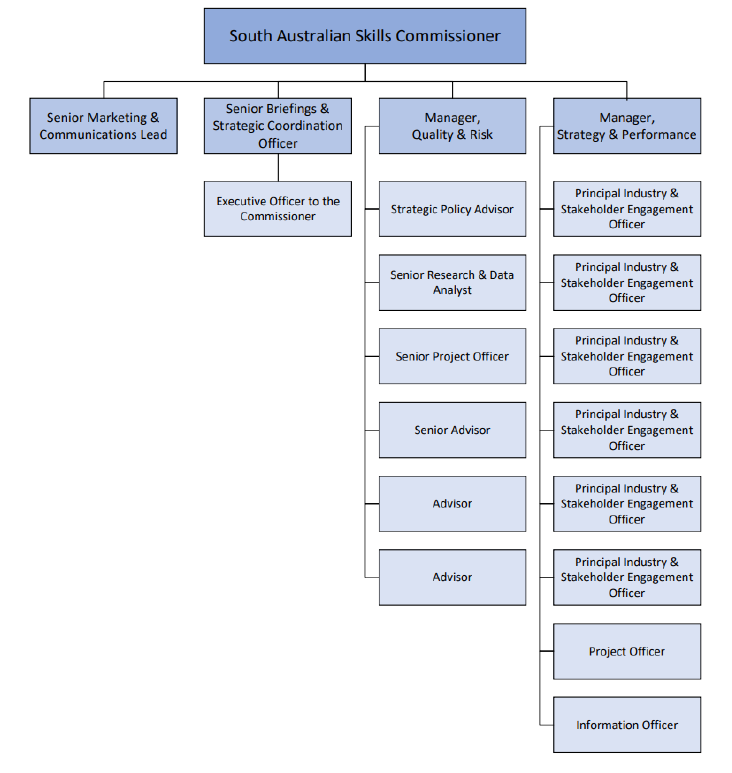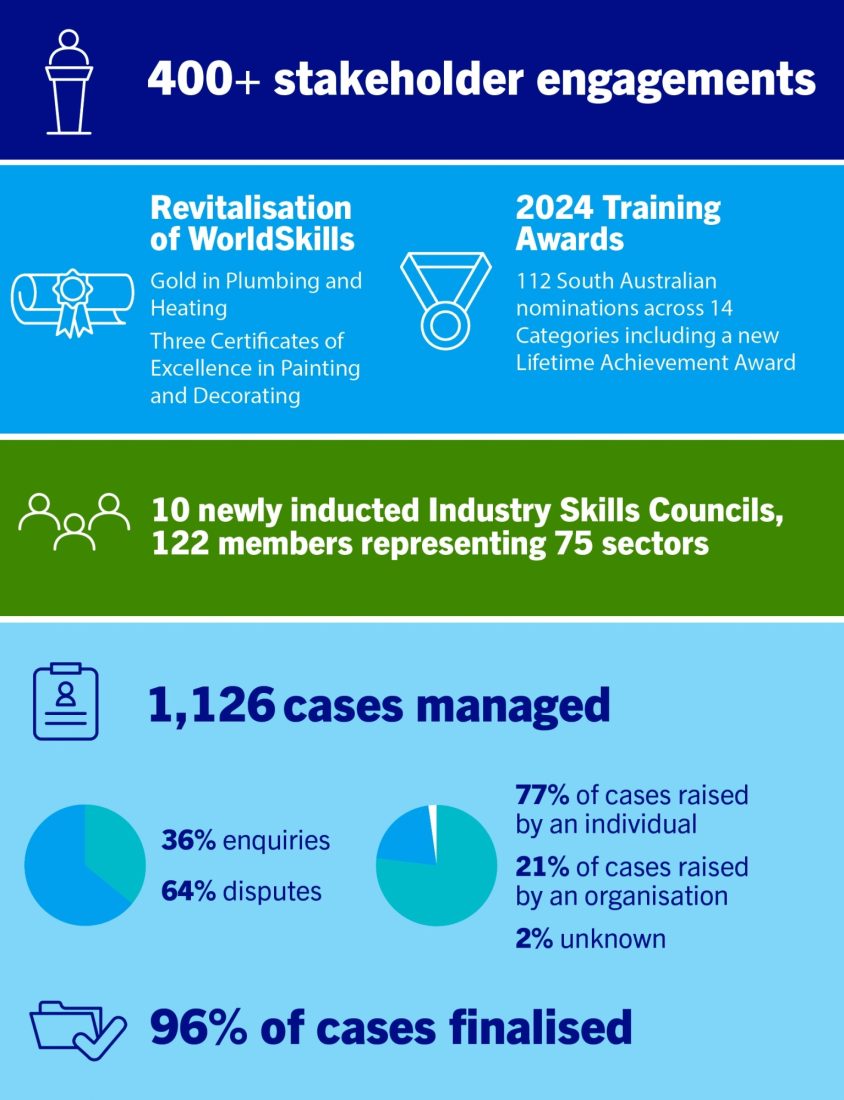I am delighted to present the South Australian Skills Commission’s annual report which summarises activity of the organisation across the 2023-24 financial year.
It has been an extremely busy twelve months. The second term of the Commission commenced on 1 July 2023, with the appointment of new members to the Board, providing broad representation designed to enhance the unique role of the Commission.
In July, I was also honoured to be appointed to the role of South Australia’s second Skills Commissioner, succeeding outgoing Commissioner, Renee Hindmarsh.
As inaugural Commissioner, Renee’s achievements in the role, together with her passion for the vocational and higher education training systems have created a legacy that I am proud to continue and build upon. I also acknowledge Sara Longbottom, who was appointed acting Skills Commissioner for the last three months of 2022-23 and continues to be a valued member of my leadership team.
This reporting period was a year of firsts for the Commission, the state and the nation.
Commencing on 1 January 2024, the National Skills Agreement represents the largest investment in skills in a decade and will support the delivery of agreed national priorities to strengthen the Vocational Education and Training (VET) sector as part of the shared skills reform agenda across governments. This includes the announcement of a $2.3 billion total investment over five years in skills and training to provide jobs for the future.
The Commission will work closely with the South Australian Government to realise outcomes of the five-year Agreement. The Commission’s interdependent priorities include: increasing apprenticeship/ traineeship completion rates and building the quality and integrity of South Australia’s apprenticeship and traineeship system.
Aligned with the National Skills Agreement, the Skills Policy Direction for South Australia: Skilled. Thriving. Connected and annual Skills Outlook provide the roadmap for supporting South Australians to obtain the skills needed to secure jobs. Delivery of the 10-year Plan for the state will be supported by the work of the Commission, Skills SA, TAFE SA, Student Pathways and Careers and the Construction Industry Training Board through local activities to create real change.
In 2023 there were 1.2 million students enrolled in government-funded training programs across Australia. The National Centre for Vocational Education Research (NCVER) reports that over 72,000 of these enrolments were in South Australia, a five per cent increase on 2022. It is critical that the training system continues to remain relevant and responsive through flexible training pathways, to encourage greater VET participation and skills development opportunities, including to meet the state’s economic challenges of the future.
In November 2023, the Commission declared Australia’s first Degree Apprenticeship to support growing workforce needs in sectors such as Defence. The Software Engineer Apprenticeship will provide individuals with an opportunity to earn while they learn through a combination of paid employment and off-job training to attain a higher education qualification. The Commission also declared the nation’s first Automotive Dual Trade Apprenticeships. These pathways are designed to support workforce requirements in the automotive sector where emphasis is being placed on workforce safety as more hybrid and battery electric vehicles enter the market.
February 2024 saw the introduction of the Commission’s refreshed industry engagement framework with ten new Industry Skills Councils (ISCs) established. ISCs are an important source of industry intelligence and in this capacity support and inform Commission advice to the Minister, including to improve VET outcomes.
Over 120 volunteer members were appointed across the ten ISCs, representing 75 industry sectors. ISCs are broadly aligned to the national Jobs and Skills Councils, providing for a level of symmetry and consistency of advice relating to the VET system and training package development. I pay tribute to and thank, outgoing members of the preceding seven ISCs, for their insights and contributions to South Australia’s education and training system.
The Commission has engaged with over 400 external stakeholders during 2023-24 to inform its advice to government. Increasing regional engagement throughout the year has been a primary focus of the Commission and has included meeting with leaders in regional areas, participating in regional workforce planning sessions and visiting regional employers to gain insights into their experience of engaging with the training system.
Apprentice and trainee safety is a critical priority the Commission. Given this, there has been a renewed focus during 2023-24, on apprentice and trainee safety and wellbeing, including as part of ongoing strengthening of the Commission’s program of regulation and compliance activity.
In October 2023, the Australian and South Australian Governments published the National VET Completions Report, which identified that 65 per cent of apprenticeship and traineeship non-completions are associated with issues in the workplace such as working conditions, supervision and training. The Commission is actively exploring further strategies and interventions to promote a positive, safe ‘on-job’ training experience for all apprentices and trainees.
This work will be led through the Commission’s Apprentice and Trainee Training and Safety Committee which comprises government regulatory agencies with shared responsibility for training, safety and wellbeing associated with apprenticeships and traineeships. The Committee’s membership includes the 2023 SA Training Awards Apprentice of the Year, Trainee of the Year and Aboriginal and Torres Strait Islander Student of the Year, who collectively represent those who are directly impacted by the work.
In 2023-24, the Commission also welcomed the Commonwealth Government review of apprenticeship support systems and apprenticeship incentives. These reviews provided the Commission with an opportunity to contribute feedback, including regarding measures to improve coordination of information and services to apprentices, trainees and employers.
In terms of support, the Commission’s dispute resolution and complaint handling service assisted over 1,100 apprentices, trainees, employers and students across the reporting period. The service provides advocacy and mediation support to apprentices, trainees and employers in dispute and assists tertiary students who have complaints about their education or training provider. Where disputes between parties cannot be resolved, the service can assist with progressing matters to the South Australian Employment Tribunal (SAET) for arbitration.
Nominations for the 2024 South Australian Training Awards opened in May with 112 nominations across 14 categories received. A new category: Lifetime Achievement Award, was introduced this year and recognises an individual’s outstanding leadership and contribution to the South Australian VET and skills sector. This year’s annual South Australian Training Awards Gala Presentation was held in September 2024. This follows the success of the 2023 event, which was attended by over 500 participants and guests.
During 2023-24, the Commission also formed a new partnership with WorldSkills Australia, underpinned by the re-establishment of a South Australian WorldSkills Committee. WorldSkills is a longstanding international initiative designed to develop and showcase trade skills. For South Australia, it is also an important opportunity to raise the profile of VET.
The important work of the Commission would not be possible without the dedication and professionalism of the team of staff within the Commission secretariat. I thank each and every one of them for their respective contributions.
I also extend my thanks and gratitude to the Honourable Blair Boyer MP, Minister for Education, Training and Skills and to Commission Board members for the support provided to me during 2023-24.
There is no doubt that there will be many more changes to come as part of the vast coordinated effort, at both the state and national level, to implement current skills reforms. I welcome the new opportunities these reforms bring to assist more people to engage in learning and to build our state’s capability to meet the challenges ahead. I thank all of the Commission’s stakeholders for your support and continued commitment.
Commissioner Cameron Baker
Chair of the South Australian Skills Commission


